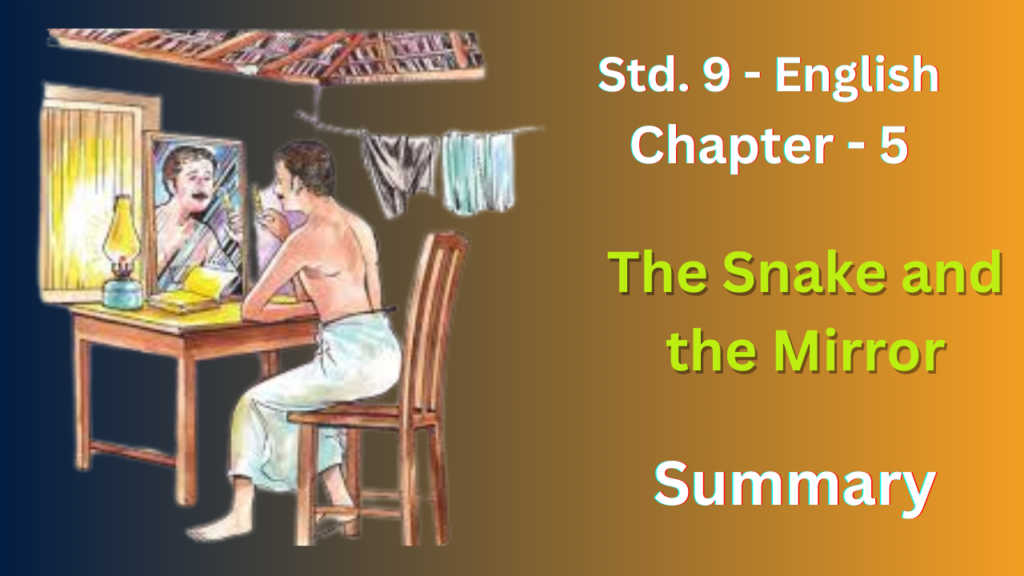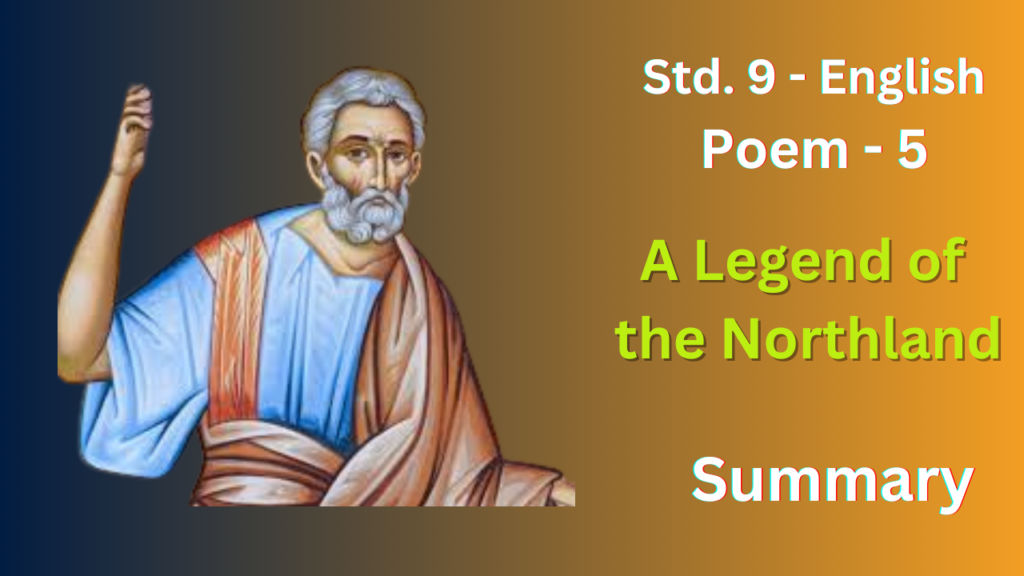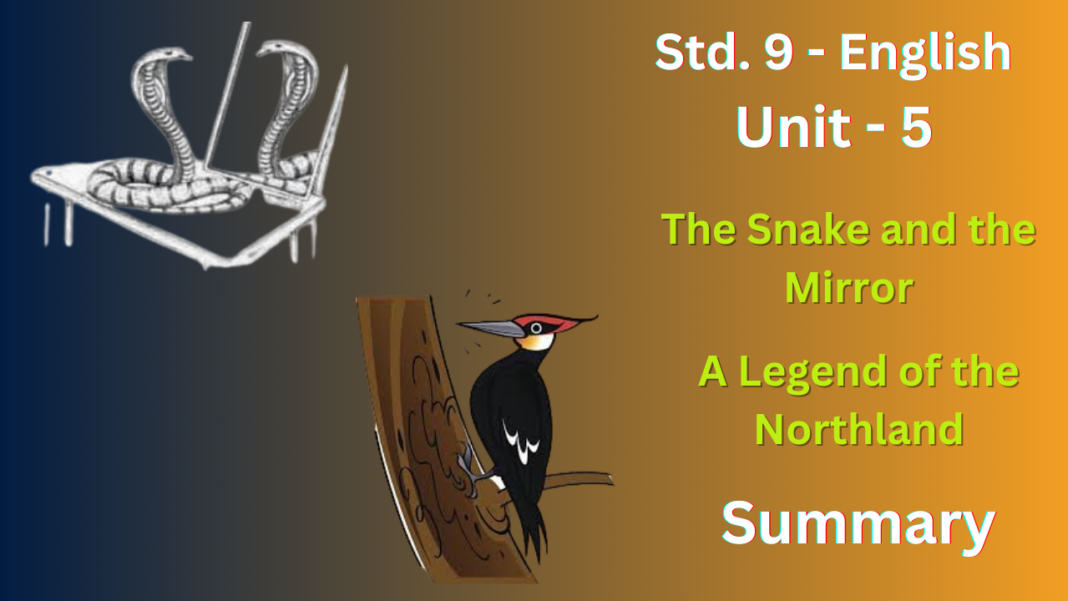NCERT Solutions for Class 9 English Chapter 5
The Snake and the Mirror
The Snake and the Mirror is a story within a story. Here’s a summary:
Outer Story:
- The narrator hears a story from a homoeopathic doctor about an encounter he had with a snake during his younger days.
Inner Story:
- The doctor, then a young man living in a rented room, encounters a snake one hot summer night.
- Startled, he prepares to defend himself, but the snake seems more interested in its reflection in a mirror on the table.
- The snake’s focus on the reflection allows the doctor to escape unharmed.
Themes:
- Appearances vs. Reality: The snake’s fascination with its own reflection makes a point about appearances being deceiving. Real threats might not always be obvious.
- Unexpected Solutions: The doctor’s escape is unexpected and highlights the element of chance in life.
- Observation and Alertness: The story emphasizes the importance of staying calm and observing a situation before reacting.
Overall:
The chapter is a short and thought-provoking story that uses a simple incident to convey larger themes. It’s a reminder to not judge things based solely on appearances and to be aware of one’s surroundings.

NCERT Solutions for Class 9 English Chapter 5
Thinking about the Text
I. Discuss in pairs and answer each question below in a short paragraph
1. “ The sound was a familiar one.” What sound did the doctor hear? What did he think it was? How many times did he hear it? (Find the places in the text.) When and why did the sounds stop?
Ans : The doctor heard the familiar sound of rats. He heard this sound four times, described as: “Again I heard that sound from above,” “Again came that noise from above,” and “Suddenly there came a dull thud as if a rubber tube had fallen.” The sounds ceased after the appearance of the snake.
2. What two “important” and “earth¬shaking” decisions did the doctor take while he was looking into the mirror?
Ans : While looking in the mirror, the doctor made two rather comical decisions, not exactly “important” ones. First, he impulsively decided to shave daily and grow a moustache, likely due to his own fright reflecting back at him. Second, he attempted to force a smile, but it came out feeble, highlighting his fear despite his attempt to appear calm
3. “I looked into the mirror and smiled,” says the doctor. A little later he says, “I forgot my danger and smiled feebly at myself.” What is the doctor’s opinion about himself when (i) he first smiles, and (ii) he smiles again? In what way do his thoughts change in between, and why?.
Ans :
(i) First Smile:
- Thought: When he first smiles, the doctor likely sees himself as brave and composed.
- Reason: The story doesn’t explicitly state his reason, but it’s implied that he might be trying to appear confident in the face of potential danger.
(ii) Second Smile:
- Thought: The second smile is described as “feeble” and suggests the doctor now feels foolish and afraid.
- Reason: Between the smiles, he realizes the source of the sound – a snake! This realization replaces his initial bravado with fear and a sense of self-deprecation.
Change in Thoughts:
His initial smile is a facade. Facing the actual danger (the snake), his perception changes. He recognizes his lack of control over the situation and his fear becomes evident in his feeble second smile.
II. This story about a frightening incident is narrated in a humorous way. What makes it humorous?
(Think of the contrasts it presents between dreams and reality. Some of them are listed below).
Write short paragraphs on each of these to get your answer.
Question 1.
- The kind of person the doctor is (money, possessions)
- The kind of person he wants to be (appearance, ambition)
Ans :
1. The doctor is a poor man with little money. His house lacks electricity and is a small rented room infested with rats. He has about sixty rupees in his suitcase. Besides some shirts and dhotis, his only other possession is a solitary black coat.
2. He wants to be a handsome person, so he decides to shave daily and grow a thin mustache. Additionally, he wishes to accumulate wealth.
Question 2.
- The person he wants to marry
- The person he actually marries
Ans :
1. He plans to marry a woman doctor who is wealthy and has a successful medical practice. He wants a plump wife so that she cannot chase after him when he makes a mistake.
2. The person he actually marries is a thin, wiry individual with the speed of a sprinter.
Question 3.
- His thoughts when he looks into the mirror
- His thoughts when the snake is coiled around his arm
Ans :
1. He believes he should look smart, so he decides to shave daily and keep his smile. He feels happy and contented when he looks in the mirror.
2. When the snake coiled around his left arm above the elbow, he remained seated, holding his breath. He became motionless, gripped by fear of the snake.
Thinking about language
1. Here are some sentences from the text. Say which of them tell you, that the author:
(a) was afraid of the snake, (b) was proud of his appearance, (c) had a sense of humour, (d) was no longer afraid of the snake.
- I was turned to stone.
- I was no mere image cut in granite.
- The arm was beginning to be drained of strength.
- I tried in my imagination to write in bright letters outside my little heart the words, ‘O God’.
- I didn’t tremble. I didn’t cry out.
- I looked into the mirror and smiled. It was an attractive smile.
- I was suddenly a man of flesh and blood.
- I was after all a bachelor, and a doctor too on top of it!
- The fellow had such a sense of cleanliness … ! The rascal could have taken it and used it after washing it with soap and water.
- Was it trying to make an important decision about growing a moustache or using eye shadow and mascara or wearing a vermilion spot on its forehead.
Ans :
- The sentences (1), (3), (4), (5) tell that the author (a) was afraid of the snake.
- The sentences (6) and (8) tell that he
(b) was proud of his appearance. - The sentences (9) and (10) tell that
(c) he had a sense of humour. - The sentences (2) and (7) tell that (d) he was no longer afraid of the snake.
2. Expressions used to show fear
Can you find the expressions in the story that tell you that the author was frightened? Read the story and complete the following sentences.
- I was turned ……………….
- I sat there holding ……………….
- In the light of the lamp I sat there like ……………….
Ans :
- I was turned to stone.
- I sat there holding my breath.
- In the light of the lamp I sat there like a stone image in flesh and blood.
3. In the sentences given below some words and expressions are italicised. They variously mean that one
- is very frightened.
- is too scared to move.
- is frightened by something that happens suddenly.
- makes another feel frightened.
Match the meanings with the words/ expressions in italics, and write the appropriate meaning next to the sentence. The first one has been done for you.
- I knew a man was following me, I was scared out of my wits,
- I got a fright when I realised how close I was to the cliff edge.
- He nearly jumped out of his skin when he saw the bull coming towards him.
- You really gave me a fright when you crept up behind me like that.
- Wait until I tell his story—it will make your hair stand on end.
- Paralysed with fear, the boy faced his abductors.
- The boy hid behind the door, not moving a muscle.
Ans :
- I knew a man was following me, I was scared out of my wits (is very frightened).
- I got a fright when I realised how close I was to the cliff edge (is frightened by something that happens suddenly).
- He nearly jumped out of his skin when he saw the bull coming towards him (is very frightened).
- You really gave me a fright when you crept up behind me like that (makes another feel frightened).
- Wait until I tell his story—it will make your hair stand on end (makes another feel frightened).
- Paralysed with fear, the boy faced his abductors (is too scared to move).
- The boy hid behind the door, not moving a muscle (is too scared to move).
4. Report these questions, using if/whether or why/when/where/how/which/what. Remember the italicised verbs change into the past tense.
- Meena asked her friend, “Do you think your teacher will come today?”
- David asked his colleague, “Where will you go this summer?”
- He asked the little boy, “Why are you studying English?”
- She asked me, “When are we going to leave?”
- Pran asked me, “Have you finished reading the newspaper?”
- Seema asked her, “How long have you lived here?”
Ans :
- Meena inquired of her friend whether her teacher had come that day.
- David inquired of his colleague where he was planning to go that summer.
- He asked the little boy why he was studying English.
- She asked me when we were going to leave.
- Pran asked me whether I had finished reading the newspaper.
- Seema asked her how long she had lived there.
Speaking
Using some of the expressions given above in exercise III, talk about an incident when you were very scared. You may have a competition to decide whose story was the most frightening.
Ans : Home alone during a storm, every creak of the old house sent shivers down my spine. A thump from the attic made my heart race. Paralyzed with fear, I finally grabbed a flashlight and climbed the stairs, trembling with each step. Should I open the attic door? The unknown was terrifying. With a burst of courage, I flung it open. The dusty attic revealed nothing but cobwebs and moonlight. Relief washed over me, but then a floorboard creaked. I nearly jumped out of my skin! Finding nothing, I retreated downstairs, shaken but determined to face my fears in the future.
Writing
1. Try to rewrite the story without its humour, merely as a frightening incident. What details or parts of the story would you leave out?
Ans :
The night was thick with silence, broken only by the occasional creak of the old floorboards beneath my feet. Alone in the rented room, a shiver ran down my spine despite the summer heat. Suddenly, a slithering sound pierced the silence, sending a jolt of terror through me.
Heart pounding, I froze, my breath catching in my throat. The sound came again, closer this time. In the dim light, I saw a length of shadow move across the floor. Panic surged through me. It was a snake.
Trapped between the source of the sound and the only exit, I didn’t dare move. The silence stretched on, broken only by the frantic hammering of my heart. My mind raced, picturing the snake’s cold scales and deadly venom.
Time seemed to lose all meaning. Just when I thought I couldn’t take the suspense any longer, there was a thud. The snake had moved again, but where? Sweat slicked my skin, and my breath came in shallow gasps.
As if in a nightmare, the silence returned. Slowly, I dared to breathe again. Straining my eyes, I searched the room, but the darkness offered no answers. Was it gone? Or was it waiting, watching me in the shadows?
Translation
The text you read is a translation of a story by a well-known Malayalam writer, Vaikom Muhammad Basheer.
In translating a story from one language to another, a translator must keep the content intact. However, the language and the style differ in different translations of the same text.
– Here are two translations of the opening paragraphs of a novel by the Japanese writer, Haruki Murakami. Read them and answer the questions given below :
| A | B |
| When the phone rang I was in the kitchen, boiling a potful of spaghetti and whistling along with FM broadcast of the overture to Rossini’s The Thieving Magpie, which has to be the perfect music for cooking pasta.I wanted to ignore the phone, not only because the spaghetti was nearly done, but because Claudio Ab- bado was bringing the London Symphony to its musical climax. | I’m in the kitchen cooking spaghetti when the woman calls. Another moment until the spaghetti is done ; there I am, whistling the prelude to Rossini s La Gazza Ladra along with the FM radio. Perfect spaghetticooking music!I hear the telephone ring but tell myself, Ignore it. Let the spaghetti finish cooking. It’s almost done, and besides, Claudio Ab- bado and the London Symphony Orchestra are coming to a crescendo. |
Compare the two translations on the basis of the following points :
- the tense of narration (past and present tense)
- short, incomplete sentences
- sentence length
Which of these translations do you like? Give reasons for your choice.
Ans :
- The tense of narration (past and present tense)
Opinion: In Column A, the sentences are written in the past tense, while in Column B, they are written in the future tense.
- Short, incomplete sentences Opinion: In Column B, short sentences are used. They are written in the present tense.
- Sentence length
Opinion :Column B contains short sentences. They are simple and easily comprehensible, and they are written in the present tense.
Reason : I prefer the paragraph marked as B. The sentences are written in the present tense, providing clear and straightforward ideas. Facts expressed in the present tense are easier to remember.
A Legend of the Northland
“A Legend of the Northland” is a ballad that tells a story about Saint Peter and a selfish old woman. Here’s a summary:
Setting: The poem describes the harsh Northland, a place with short days and long, cold nights.
The Encounter: Saint Peter, traveling the world, arrives at the old woman’s cottage feeling hungry and weary. He politely asks for a piece of cake, but she hesitates, wanting to keep her treats for herself.
Missed Chances: Saint Peter makes multiple requests, each time the woman finds an excuse not to share.
The Curse: Angered by her greed, Saint Peter curses the woman. She transforms into a woodpecker, condemned to forever peck on wood in search of food, never satisfied.
Moral Lesson: The poem ends with a message about the importance of kindness and generosity.
Themes:
- Selfishness vs. Generosity: The central theme is the contrast between the woman’s greed and Saint Peter’s initial request for a simple act of kindness.
- Consequences of Actions: The woman’s selfish behavior results in a permanent and harsh punishment.
- Importance of Sharing: The poem suggests that sharing what you have brings more satisfaction than hoarding possessions.

NCERT Solutions for Class 9 English Chapter 5
Thinking About the Poem
I.
1. Which country or countries do you think “the Northland” refers to?
Ans : “The Northland” in the poem is likely not a specific country, but a symbolic place with a cold climate. Short days and long nights suggest a location closer to the North Pole. It could represent Scandinavia (Norway, Sweden, Finland, Iceland), Northern Canada, Alaska, or any region with a harsh winter. The poem’s focus is on the universal themes, not the exact geography.
2. What did Saint Peter ask the old lady for? What was the lady’s reaction?
Ans : Saint Peter, feeling hungry and weary from his travels, politely asked the old lady for a piece of cake. However, the lady’s reaction was far from generous.
The poem describes her as hesitant and unwilling to share. She made excuses and tried to avoid giving Saint Peter even a small piece of her cake, revealing her selfish nature.
3.How did he punish her?
Ans : In “A Legend of the Northland,” Saint Peter punished the selfish old lady with a transformation. He cursed her to become a woodpecker.
4. How does the woodpecker get her food?
Ans : The poem doesn’t directly say how the transformed woodpecker gets food, but based on real woodpecker behavior, we can make some educated guesses. Woodpeckers peck holes in trees to find insects and seeds hidden beneath the bark or inside
5. Do you think that the old lady would have been so ungenerous if she had known who Saint Peter really was? What would she have done then?
Ans : It’s highly likely the old lady in “A Legend of the Northland” would have acted differently if she knew Saint Peter’s true identity
6. Is this a true story? Which part of this poem do you feel is the most important?
Ans :“A Legend of the Northland” isn’t a factual story but a legend, a tale passed down with a lesson. It focuses on the message, not historical accuracy. The most important part could be the dramatic transformation, a symbol of punishment, or the core message about generosity versus selfishness.
7. What is a legend? Why is this poem called a legend?
Ans : I prefer the paragraph labeled B. The sentences are written in the present tense and convey clear, straightforward ideas. Facts expressed in the present tense are easier to remember.
8. Write the story of ‘A Legend of the Northland’ in about ten sentences.
Ans : In the cold Northland, where nights are long, a weary Saint Peter arrives at an old woman’s cottage. He politely asks for a piece of her cake, but the greedy woman refuses, wanting to keep it all for herself. Despite repeated requests, Saint Peter remains unsuccessful. Infuriated by her selfishness, he curses the woman, transforming her into a woodpecker. Forever condemned, she pecks at trees in the harsh Northland, forever searching for food she can never seem to find. This harsh fate serves as a reminder of the importance of generosity and the consequences of greed.
II.
1. Let’s look at words at the end of the second and fourth lines, viz., ‘snows’ and ‘clothes’, ‘true’ and ‘you’, ‘below’ and ‘know’. We find that ‘snows’ rhymes with ‘clothes’, ‘true’ rhymes with ‘you’ and ‘below’ rhymes with ‘know’.
Find more such rhyming words
Ans : Earth-hearth, done-one, lay-away, another-over, flat-that, faint-saint, form- worm, food-wood, same-flame.
NCERT Solutions for Class 9 English Chapter 5









